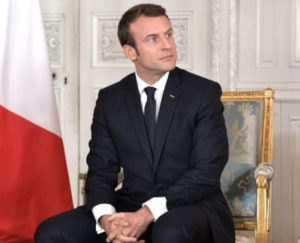
Emmanuel Macron has an appetite for big challenges. Not content with trying to rescue the Paris Agreement, the Iran nuclear deal, and stare down waves of strikes at home, he now wants to completely overhaul the WTO. His call came at an OECD forum, at the end of which the United States pointedly refused to agree to a communiqué rejecting protectionism, and with US tariffs on EU steel and aluminium looming. Both these stances have underlined the current US administration’s low view of multilateralism.
Mr. Macron is a man for challenges, but is he a man with a plan? In this case, he has not said exactly what an overhaul of the WTO would mean, other than that it would begin with a major negotiation involving major partners – the US, the EU, Japan and China. Perhaps other G-20 members would also take part since the ambition is to have something to show at the end of the G-20 summit in Buenos Aires on 1 December. So what would a good plan to overhaul the WTO look like?
Reform begins at home.
Calls to overhaul the multilateral trading system are not new. In the early 1990’s, the late Professor Lester Thurow derided the GATT (the treaty that preceded the WTO agreements and then was rolled into them) as the “General Agreement to Talk and Talk”, and then proclaimed that the “GATT is dead”. He was wrong. But similar criticisms have been made – less colourfully – at every WTO ministerial over the last 15 years as little or no progress has been made on negotiations.
But if negotiators talk endlessly, without agreeing, don’t blame the forum. True, decision by consensus across 150+ members is a nightmarish idea. But in the case of trade it shouldn’t be. Remember that trade liberalisation primarily benefits the party doing the liberalisation. Trade negotiations exist to help overcome some of the political economy hurdles to doing that. If trade negotiations are not progressing, then a major reason is likely to be a lack of will at home to do the hard yards.
So, if Mr. Macron wants to overhaul the world trading system, he might want to start in his own backyard. Agriculture is an obvious example. The French (and others) have long dragged their feet on EU farm reform, and the lack of momentum here has acted as a dead weight on trade negotiations since the launch of the Uruguay Round in 1986. To be sure, the EU is not the only culprit here. American farmers like their subsides, as do their counterparts in Japan, Canada and Korea. But tackling this at the EU level will remove a shield behind which other protectionists hide.
Agriculture is just one case of course. Another would be services, where plenty of work needs to be done. Even in the bread and butter area of tariffs, there is unfinished business. There is simply no sound reason why the EU should impose, for example, tariffs of 10% or more on motor vehicles, and even higher ones on apparel and footwear.
How special, how different?
Part of the reason trade talks are hard push forward is that the WTO has historically allowed developing countries to undertake lower levels of liberalisation and of commitments to WTO rules, under the guise of “special and differential treatment” (S&D). That approach was partially tidied up under the Uruguay Round, which favoured the use of transition time periods rather than indefinite opt-outs. But developing countries then devoted a huge amount of time and energy in an ill-thought out attempt to renegotiate key aspects of rules. Not only did this waste – and continues to waste – a tremendous amount of time, it also provides a good cover for large, rich countries to ask themselves how they might exploit loopholes within the system (case in point: the US invoking national security exemptions).
Overhauling the WTO would mean dispensing with the nebulous notion of “developing countries” , and dispensing with S&D as a good basis for addressing development issues. The counterpart to this would be to invest more in helping poorer countries reduce costs that hamper their ability to do trade; and domestic reform in richer countries. To rehash the point made above, there is no point preaching liberalisation to partners if one is unwilling to do the same at home.
What has three legs in the evening?
The WTO has three legs – its negotiation function, its dispute settlement function, and its trade policy review function. The first of these is paralysed, the second is overloaded and might soon be hamstrung if the US blocks the appointment of appeals judges, and the third of these has atrophied through years of neglect.
Any plan to get the WTO up and running needs to deal with all three elements. Paralysis in negotiation may explain, in part, why dispute settlement is overloaded. But disputes could be prevented if policy reviews were taken more seriously, and in particular if they were allowed to play a bigger role in highlighting the costs of protectionist policies in the countries that pursue them. For that to have any effect, it would likely need institutional reform at home. In particular, finance or economics ministries (who are more sensitive to costs and averse to the special pleading protectionism inevitably involves) will need to take a bigger role.
None of these points are particularly new. The issue, to crib from G.K. Chesterton, is not that they have been tried and found wanting, but have been found to be too difficult and therefore not been attempted. Can Mr. Macron move things along? He came to power having been a reform-minded economics minister. He therefore knows the costs of pandering to special interests. Mr. Macron also prides himself on applying the principles of “start-ups” and “disruptions” to government and politics. Overhauling multilateral institutions will require the application of that mindset to the principles set out above.